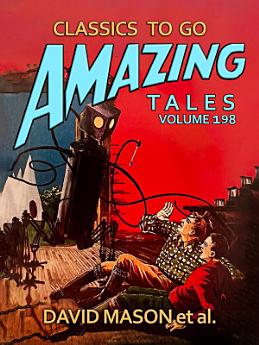Amazing Tales Volume 198
Dec 2024 · CLASSICS TO GO Book 198 · Otbebookpublishing
Ebook
83
Pages
family_home
Eligible
info
reportRatings and reviews aren’t verified Learn More
About this ebook
Amazing Tales Volume 198, curated by David Mason and fellow authors, presents a diverse collection of six science fiction and fantasy stories that challenge perceptions and entertain. In "Farewell Message," David Mason crafts a narrative through the eyes of an alien named V'gu, who critiques humanity's self-destructive tendencies during his Earth visit. E. D. Skinner's "Electro-Episoded in A.D. 2025" humorously explores love and societal quirks as Lieutenant-Colonel Algernon Sidney St. Johnstone faces wild challenges in a futuristic world. Allen K. Lang's "Box-Garden" satirizes the advertising industry through a dialogue about bonsai trees, revealing the superficiality and manipulation within media. Charles V. De Vet's "Death of a Mutant" examines the fear of the unknown through the tragic life of a psychic boy, questioning societal responses to difference. Gene Cross's "The Nobles Are Coming" masterfully blends horror and science fiction on Mars, where archeologist Ross and prospector J.J. Abrogado encounter terrifying enigmas. Finally, Arthur T. Harris's "True to Type" delves into supernatural happenings as a neglected typewriter takes revenge, exploring the ethics of authorship and plagiarism. With themes ranging from human-alien encounters and the impact of technology to advertising satire and the supernatural, this anthology offers something for every reader. Dive into Amazing Tales Volume 198 for a thought-provoking journey across genres, where every story invites reflection on humanity, creativity, and the cosmos. Perfect for fans of science fiction, fantasy, and speculative tales, this collection assures an engaging experience that resonates long after the final page is turned.
About the author
David Mason, a luminary in the realm of speculative fiction, was born in 1924 in the bustling city of Chicago. His early years were marked by a voracious appetite for literature, which led him to explore the boundaries of human imagination through writing. Mason's work is often celebrated for its intricate blend of hard science fiction and profound philosophical inquiry, a combination that has left an indelible mark on the genre.Mason's literary career took off in the mid-20th century, a period rife with technological optimism and Cold War anxieties. His stories often grappled with the ethical implications of scientific advancements, reflecting the era's tensions and hopes. He was known for his meticulous world-building and complex characters, which set a new standard for narrative depth in science fiction.One of Mason's most notable contributions was his advocacy for the New Wave movement in science fiction, which sought to elevate the genre through experimental writing styles and more sophisticated themes. This movement challenged the traditional boundaries of science fiction and paved the way for future generations of writers.Despite his acclaim, Mason was not without controversy. His outspoken views on the potential dangers of unchecked technological progress and his critiques of government policies during the Cold War era drew both admiration and ire. These stances, however, only cemented his reputation as a thought leader unafraid to tackle contentious issues.Mason's influence extends to contemporary writers who continue to explore the ethical dimensions of science and technology. His legacy is one of intellectual rigor and imaginative daring, making him a pivotal figure in the evolution of modern speculative fiction.
Rate this ebook
Tell us what you think.
Reading information
Smartphones and tablets
Install the Google Play Books app for Android and iPad/iPhone. It syncs automatically with your account and allows you to read online or offline wherever you are.
Laptops and computers
You can listen to audiobooks purchased on Google Play using your computer's web browser.
eReaders and other devices
To read on e-ink devices like Kobo eReaders, you'll need to download a file and transfer it to your device. Follow the detailed Help Center instructions to transfer the files to supported eReaders.










